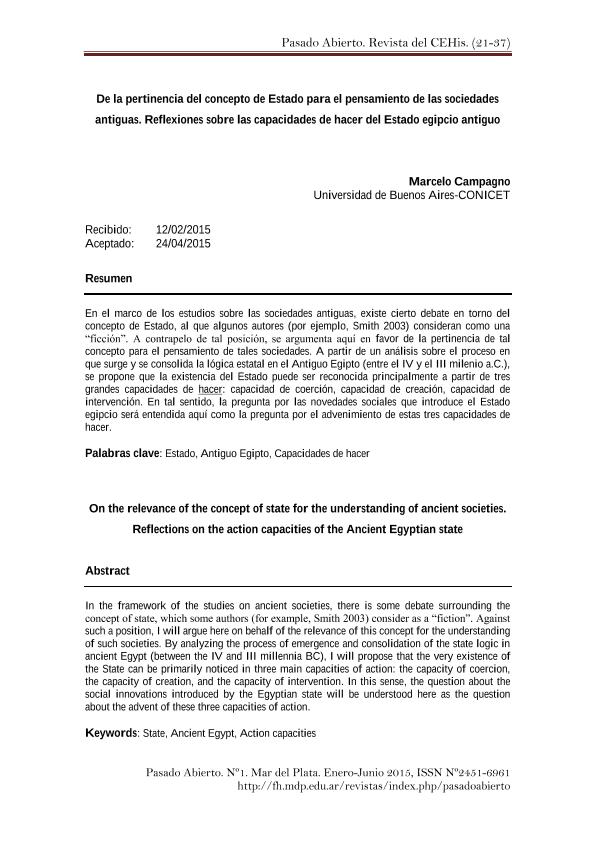Mostrar el registro sencillo del ítem
dc.contributor.author
Campagno, Marcelo Pedro

dc.date.available
2015-10-30T13:44:34Z
dc.date.issued
2015-06
dc.identifier.citation
Campagno, Marcelo Pedro; De la pertinencia del concepto de Estado para el pensamiento de las sociedades antiguas. Reflexiones sobre las capacidades de hacer del Estado egipcio antiguo; Centro de Estudios Históricos. Universidad Nacional de Mar del Plata; Pasado Abierto.; 1; 6-2015; 21-37
dc.identifier.issn
2451-6961
dc.identifier.uri
http://hdl.handle.net/11336/2587
dc.description.abstract
En el marco de los estudios sobre las sociedades antiguas, existe cierto debate en torno del concepto de Estado, al que algunos autores (por ejemplo, Smith 2003) consideran como una “ficción”. A contrapelo de tal posición, se argumenta aquí en favor de la pertinencia de tal concepto para el pensamiento de tales sociedades. A partir de un análisis sobre el proceso en que surge y se consolida la lógica estatal en el Antiguo Egipto (entre el IV y el III milenio a.C.), se propone que la existencia del Estado puede ser reconocida principalmente a partir de tres grandes capacidades de hacer: capacidad de coerción, capacidad de creación, capacidad de intervención. En tal sentido, la pregunta por las novedades sociales que introduce el Estado egipcio será entendida aquí como la pregunta por el advenimiento de estas tres capacidades de hacer.
dc.description.abstract
In the framework of the studies on ancient societies, there is some debate surrounding the concept of state, which some authors (for example, Smith 2003) consider as a “fiction”. Against such a position, I will argue here on behalf of the relevance of this concept for the understanding of such societies. By analyzing the process of emergence and consolidation of the state logic in ancient Egypt (between the IV and III millennia BC), I will propose that the very existence of the State can be primarily noticed in three main capacities of action: the capacity of coercion, the capacity of creation, and the capacity of intervention. In this sense, the question about the social innovations introduced by the Egyptian state will be understood here as the question about the advent of these three capacities of action.
dc.format
application/pdf
dc.language.iso
spa
dc.publisher
Centro de Estudios Históricos. Universidad Nacional de Mar del Plata
dc.rights
info:eu-repo/semantics/openAccess
dc.rights
Atribución-NoComercial-CompartirIgual 2.5 Argentina (CC BY-NC-SA 2.5 AR)
dc.rights.uri
https://creativecommons.org/licenses/by-nc-sa/2.5/ar/
dc.subject
Estado
dc.subject
Antiguo Egipto
dc.subject
Capacidades de Hacer
dc.subject.classification
Otras Historia y Arqueología

dc.subject.classification
Historia y Arqueología

dc.subject.classification
HUMANIDADES

dc.title
De la pertinencia del concepto de Estado para el pensamiento de las sociedades antiguas. Reflexiones sobre las capacidades de hacer del Estado egipcio antiguo
dc.title
On the relevance of the concept of state for the understanding of ancient societies.
Reflections on the action capacities of the Ancient Egyptian state
dc.type
info:eu-repo/semantics/article
dc.type
info:ar-repo/semantics/artículo
dc.type
info:eu-repo/semantics/publishedVersion
dc.date.updated
2016-03-30 10:35:44.97925-03
dc.journal.volume
1
dc.journal.pagination
21-37
dc.journal.pais
Argentina

dc.journal.ciudad
Mar del Plata
dc.description.fil
Fil: Campagno, Marcelo Pedro. Consejo Nacional de Investigaciones Científicas y Técnicas. Oficina de Coordinación Administrativa Saavedra 15. Instituto Multidisciplinario de Historia y Ciencias Humanas; Argentina. Universidad de Buenos Aires; Argentina
dc.journal.title
Pasado Abierto.
dc.relation.alternativeid
info:eu-repo/semantics/altIdentifier/url/http://goo.gl/F9hTPr
Archivos asociados
